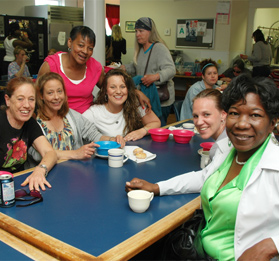Five Ways to Help an Alcoholic, Addict or Dysfunctional Person
1. Prayer
Since the alcoholic, addict or dysfunctional person cannot be helped until he or she wants help, it is necessary that we begin to pray for them, asking that God will bring them to that place that he/she will seek help. Do not be discouraged. Things might get worse before they get better; but remember, God answers prayer. 
2. Offer the Gospel
In Romans 1:16 we read, “For I am not ashamed of the gospel of Christ, for it is the power of God unto salvation to everyone that believeth.”
So often, we tend to try everything but the power of God in helping the addicted or dysfunctional person. Now it is true that he may always need medical help, possibly psychiatric help, and the help of a counselor may be profitable; but without the power of Christ working in the life of this individual, nothing will be of lasting value. Witness to him or her of your own faith in Christ and through your church, putting them in contact with others who have a vital testimony to the power of God to change lives.
Good Christian literature will also be a help in getting this message across and we would be glad to make suggestions as to what books he might find profitable.
3. Fellowship
One of the strongest points of recovery groups is the fellowship that they have one with the other. It is necessary that when an alcoholic, addict or dysfunctional person makes a step toward recovery that we be willing to offer them fellowship, to make them feel welcome, to make them feel needed and to encourage them to share with others. This could be done through CIR or through the fellowwship of a church or a Christian businessmen’s committee such as a Gideon Camp.
Five Ways to Help an Alcoholic, Addict or Dysfunctional Person Read More »






 people prefer the ‘good old days’ when they were more compliant and self-sacrificing. Unpleasant emotions, once medicated with addictive substances or processes, may be experienced as threats to relationships that have adapted over the years to the insanity of addiction. Some people in recovery experience hostility when they start telling the truth in social systems which have been committed to silence for generations. Other people experience shame and rejection when people are skeptical about or merely uncomfortable with the changes that recovery brings.
people prefer the ‘good old days’ when they were more compliant and self-sacrificing. Unpleasant emotions, once medicated with addictive substances or processes, may be experienced as threats to relationships that have adapted over the years to the insanity of addiction. Some people in recovery experience hostility when they start telling the truth in social systems which have been committed to silence for generations. Other people experience shame and rejection when people are skeptical about or merely uncomfortable with the changes that recovery brings.
